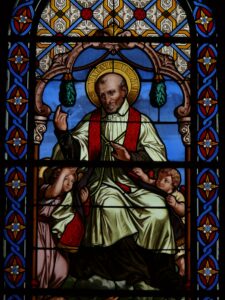Charity
 Definition and Explanation
Definition and Explanation
- Catechism of the Catholic Church, point 1822:
- "Charity is the theological virtue by which we love God above all things for His own sake, and our neighbor as ourselves for the love of God."
- Thomas Aquinas' Summa Theologiae, IIa.IIae, question 23:
- Charity is the virtue of friendship with God, which orders man's actions so that he unites himself with God.
- Charity's principle end is God; other human beings are loved out of charity, for God's sake.
- Because charity orders us to our ultimate end, no true virtue can be had without it. Without it, virtuous actions cannot fail to be imperfect.
Examples from Western History and Literature

Socrates' Speech
“But how would it be, in our view... if someone got to see the Beautiful itself, absolute, pure, unmixed, not polluted by human flesh or colors or any other great nonsense of mortality, but if he could see the divine Beautiful itself in its one form? Do you think it would be a poor life for a human being to look there and to behold it by that which he ought, and to be with it? Or haven’t you remembered... that in that life along, when he looks at Beauty in the only way that Beauty can be seen––only then will it become possible for him to give birth not to images of virtue (because he’s in touch with no images), but to true virtue (because he is in touch with true Beauty). The love of the gods belongs to anyone who has given birth to true virtue and nourished it, and if any human being could become immortal, it would be he.” (Symposium 211e-212b)

The Gospel of John
John 13:33-5: “My children, I will be with you only a little while longer. You will look for me, and as I told the Jews, ‘Where I go you cannot come,’ so now I say it to you. I give you a new commandment:love one another. As I have loved you, so you also should love one another. This is how all will know that you are my disciples, if you have love for one another.”

St. Paul on Love
Love is patient, love is kind. It is not jealous, [love] is not pompous, it is not inflated, it is not rude, it does not seek its own interests, it is not quick-tempered, it does not brood over injury, it does not rejoice over wrongdoing but rejoices with the truth. It bears all things, believes all things, hopes all things, endures all things. Love never fails. (1Cor 13:4-8)

St. Augustine's "Confessions"
Chapter 1: “Great art Thou, O Lord, and greatly to be praised; great is Thy power, and Thy wisdom infinite. And Thee would man praise; man, but a particle of Thy creation; man, that bears about him his mortality, the witness of his sin, the witness, that “Thou resistest the proud”: yet would man praise Thee; he, but a particle of Thy creation. Though awakest us to delight in Thy praise; for Thou madest us for Thyself, and our heart is restless until it rests in Thee.”

Virgil to Dante
My son, there’s no Creator and no creature who ever was without love––the natural or mental; and you know that...The natural is always without error, but mental love may choose an evil object or err through too much or too little vigor. As long as it’s directed toward the First Good and tends toward secondary goods with measure, it cannot be the cause of evil pleasure; but when it twists toward evil, or attends to good with more or less care than it should, those whom He made have worked against their Maker. From this you see that––of necessity––love is the seed in you of every virtue and of all acts deserving punishment. (Purgatorio XVII.91-105)

Charity in "Paradise Lost"
"Henceforth I learn that to obey is best, / And love with fear the only God, to walk / As in his presence, ever to observe / His providence, and on him sole depend, / Merciful over all his works, with good / Still overcoming evil and by small / Accomplishing great things, by things deemed weak / Subverting worldly strong, and worldly wise / By simply meek, that suffering for truth’s sake / Is fortitude to highest victory, / And, to the faithful, death the gate of life: / Taught this by his example whom I now / Acknowledge my redeemer ever blessed.” / To whom thus also the angel last replied: / “This having learned, though hast attained the sum / Of wisdom… / Only add / Deeds to thy knowledge answerable; add faith, / Add virtue, patience, temperance; add love, / By name to come called ‘charity,’ the soul / Of all the rest: then wilt thou not be loath / To leave this Paradise but shalt possess / A paradise within thee, happier far.” (Paradise Lost 12.561-587)

Shakespeare’s Sonnet 116
Let me not to the marriage of true minds / Admit impediments. Love is not love / Which alters when it alteration finds, / Or bends with the remover to remove. / O no! it is an ever-fixed mark / That looks on tempests and is never shaken; / It is the star to every wand'ring bark, / Whose worth's unknown, although his height be taken. / Love's not Time's fool, though rosy lips and cheeks / Within his bending sickle's compass come; / Love alters not with his brief hours and weeks, / But bears it out even to the edge of doom. / If this be error and upon me prov'd, / I never writ, nor no man ever lov'd.
